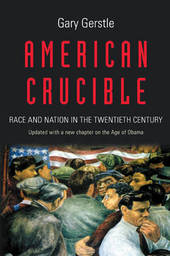
|
American Crucible: Race and Nation in the Twentieth Century
Paperback / softback
Main Details
| Title |
American Crucible: Race and Nation in the Twentieth Century
|
| Authors and Contributors |
By (author) Gary Gerstle
|
| Physical Properties |
| Format:Paperback / softback | | Pages:544 | | Dimensions(mm): Height 235,Width 152 |
|
| ISBN/Barcode |
9780691173276
|
| Classifications | Dewey:973.9 |
|---|
| Audience | | Undergraduate | | Postgraduate, Research & Scholarly | |
|---|
| Edition |
Revised edition
|
|
Publishing Details |
| Publisher |
Princeton University Press
|
| Imprint |
Princeton University Press
|
| Publication Date |
28 February 2017 |
| Publication Country |
United States
|
Description
This sweeping history of twentieth-century America follows the changing and often conflicting ideas about the fundamental nature of American society: Is the United States a social melting pot, as our civic creed warrants, or is full citizenship somehow reserved for those who are white and of the "right" ancestry? Gary Gerstle traces the forces of civic and racial nationalism, arguing that both profoundly shaped our society. After Theodore Roosevelt led his Rough Riders to victory during the Spanish American War, he boasted of the diversity of his men's origins- from the Kentucky backwoods to the Irish, Italian, and Jewish neighborhoods of northeastern cities. Roosevelt's vision of a hybrid and superior "American race," strengthened by war, would inspire the social, diplomatic, and economic policies of American liberals for decades. And yet, for all of its appeal to the civic principles of inclusion, this liberal legacy was grounded in "Anglo-Saxon" culture, making it difficult in particular for Jews and Italians and especially for Asians and African Americans to gain acceptance. Gerstle weaves a compelling story of events, institutions, and ideas that played on perceptions of ethnic acial difference, from the world wars and the labor movement to the New Deal and Hollywood to the Cold War and the civil rights movement. We witness the remnants of racial thinking among such liberals as FDR and LBJ; we see how Italians and Jews from Frank Capra to the creators of Superman perpetuated the New Deal philosophy while suppressing their own ethnicity; we feel the frustrations of African-American servicemen denied the opportunity to fight for their country and the moral outrage of more recent black activists, including Martin Luther King, Jr., Fannie Lou Hamer, and Malcolm X. Gerstle argues that the civil rights movement and Vietnam broke the liberal nation apart, and his analysis of this upheaval leads him to assess Reagan's and Clinton's attempts to resurrect nationalism. Can the United States ever live up to its civic creed? For anyone who views racism as an aberration from the liberal premises of the republic, this book is must reading. Containing a new chapter that reconstructs and dissects the major struggles over race and nation in an era defined by the War on Terror and by the presidency of Barack Obama, American Crucible is a must-read for anyone who views racism as an aberration from the liberal premises of the republic.
Author Biography
Gary Gerstle is the Paul Mellon Professor of American History at the University of Cambridge and the author of Liberty and Coercion (Princeton).
ReviewsWinner of the 2002 Theodore Saloutos Memorial Book Award "The publication of this book could not be more timely. The first eighty pages should be compulsory reading for anybody in the United Kingdom (and elsewhere) involved with immigrants or asylum-seekers, whether at the level of policy-making, policy administration, or merely as citizen hosts."--Jim Potter, Times Literary Supplement "This informed and well-argued study is a strong addition to the literature on race, multiculturalism, and citizenship in the U.S ... Gerstle [has] in this engrossing, powerfully argued study ... a meticulous eye for detail."--Publishers Weekly "This tightly argued historical synthesis is likely to be ... influential to understanding the evolution of American nationalism in the past 100 years."--Library Journal "American Crucible is an illuminating addition to what has become a vibrant academic cottage industry, the study of nationalism... [A] confident and elegantly written narrative."--John T. McGreevy, Chicago Tribune "A fresh and accessible book that fully examines [a] fundamental American paradox. He has credibly and fascinatingly, traced the odd mixture of high ideals and base doubts that shaped race and immigration policy over the last century."--Joseph Dolman, The New Leader "The most probing and thought-provoking history of American nationalism ever written."--James Green, The Boston Globe "Gerstle straddles the Old and the New Left, and this gives him a perspective that frequently makes for a fertile and unpredictable analysis."--Peter Skerry, National Journal "A brilliant interpretation of how ideas about race and national identity have defined the U.S. in the 20th century... Engagingly written, wearing its historical learning lightly and combining pertinent cultural examples with political events, American Crucible is a work of profound historical originality and political significance that confirms Gerstle as the doyen among historians of Americanism."--Desmond King, Times Higher Educational Supplement "[An] exemplary analysis... Thanks to American Crucible, the nature of [the] complexities, contradictions, and burdens [of nationalism] are made clear."--Susan Curtis, American Nationalism "A model of clear writing ... engaging and informative."--Steven Goodson, History: Reviews of New Books "An ambitious and provocative synthetic study... Gerstle's larger argument that race has been central to the definition of the American nation in the twentieth century is, ultimately, persuasive and should provoke considerable discussion on the historical character and boundaries of citizenship in the United States."--Eric Arnesen, The Journal of American History "American Crucible is a valuable text for all students of the twentieth century. Framed around a vital concept, it charts the ebb and flow of ethnic and civic strains in American life... This engaging and clearly written book is also timely."--Andrew M. Kaye, Journal of American Studies "A penetrating look at 20th-century America... Highly recommended."--Choice
|